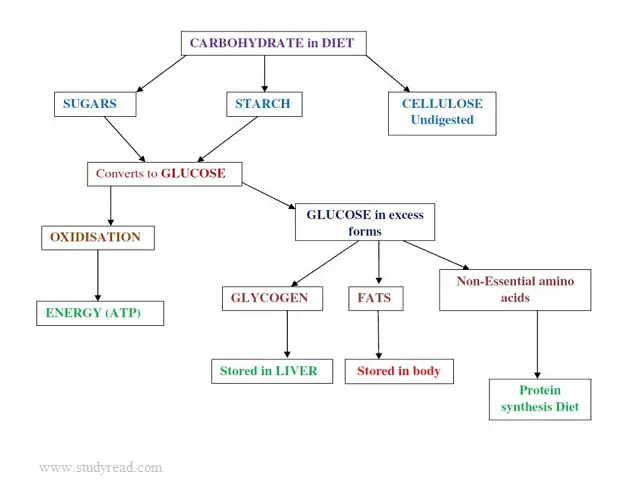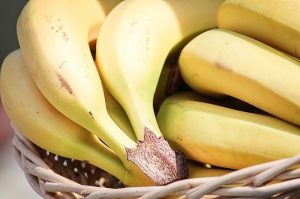Carbohydrates have prominent physiological importance in the body.
Without them, there exists no physiology in the body and also life on the earth.
After water and protein, they comprise the most abundant matter in the body and are significant nutrients of the body.
The carbohydrate chemistry is comprised of 3 elements viz. carbon, hydrogen, and oxygen.
So the name Carbo-hydrate (as carbon and hydrate, i.e., H2O respectively).
The food we eat mostly comprises of carbohydrates to a greater extent than other macro and micro-nutrients.

Function of carbohydrates include:

1. Provide instant energy to the body: This appears to be the primary function of carbohydrates in the body.
Carbohydrates which we consume as food in the form of starch (ex: potato, bread), sucrose (ex: sugar, fruits), etc. get digested in the body to release glucose. This glucose after being absorbed into blood reaches all the body tissues and cell.
There it gets metabolized to release energy in the form of ATP in the presence of oxygen inside the mitochondria. Thus, energy is produced in the body due to the breakdown of carbohydrates and it is the prime function of carbohydrates.
2. Reserve food: Carbohydrate is also stored as the reserve food in the body. This is a precautionary measure for the body to cope up in times of hunger. The excess glucose which is obtained by food is converted to glycogen in the body. This conversion of glucose to glycogen happens in the presence of the hormone insulin. This glycogen is stored in the liver and to a small extent in the skeletal muscles. In times of starvation, this glycogen converts back to glucose and provides energy.
However, excess of these leads to obesity and other diseases like diabetes. So, those to lose weight one have regulate their carb diets intake.

3. Carbohydrates form other biomolecules: Carbohydrates in excess are converted into other bio-molecules of physiological importance. They mostly get stored in the form of fats.
They undergo fatty acid synthesis reaction in the cell for storage in the body and use in times of starvation.
4. Detoxification of the body by metabolism: Many drugs and toxic wastes in the body are metabolized for easy excretion in the body. Some of these are water-insoluble and hence they are difficult to be expelled in urine. Body converts them into glucuronosyl conjugates using the glucuronosyl moiety derived from carbohydrates.
A carbohydrate moiety like glucose combines with uronic acid to form glucuronate. These conjugates of insoluble substances with glucuronosyl are more water-soluble and easily excreted from the body. Thus detoxification of physiological importance is carried out to some extent with carbohydrate derivatives.
5. As reaction intermediates or accessories: Carbohydrates participate as reaction intermediates in some vital reactions. This function of carbohydrates is seen extensively in various cellular reaction.
For example, one of the vitamins, Vitamin B2 also called Riboflavin has a ribose sugar moiety. This ribose is a four carbon type of carbohydrate monomer by its chemical structure. It is involved in vital reactions at the organ and cellular level. Similarly, carbohydrates are also chemical constituents of many hormones, vitamins, enzymes, etc.
6. Constitute genetic material: Carbohydrates form a part of DNA and RNA in the form of deoxyribose and ribose sugars. These are five carbon monosaccharides formed form heptulose sugars by the pseudo-heptulose pathway.
7. They are constituents of all the cellular organelles. Carbohydrates are also components of cell organelles like the cell membrane, mitochondria, nucleus, endoplasmic reticulum, etc. They provide structural integrity, mechanical strength in combination with proteins and lipids. They help make up the body mass by being included in all the parts of the cell and tissues. For example, in cell membranes, there are two constituents, i.e., glycolipid layer and glycoprotein layer. Here the term “glyco” is a carbohydrate.
8. Transport of oxygen: Glucose is taken by red blood cells. These are the types of blood cells which lack mitochondria and other cell organelles required for producing energy. In such a case, the ATP is produced by a non-oxidative pathway with the end product as lactose and ATP.
This energy thus produced is necessary for hemoglobin to bind to oxygen molecules. These bound oxygen molecules are transferred from lungs to the different tissues.
9. Aid in gut motility: Our diet has carbohydrates in greater proportions because, it aids in bowel movement. When you suffer from constipation, doctors first prescribe you bran and other carbohydrate material like Ispaghula. The carbohydrates in these material is in the form of fibrous material. When they are ingested, their material absorbs water in the guts, swells and increases the load.

This load is useful to increase intestinal motility and expulsion of waste (feces). Thus carbohydrates help clear gut and prevent constipation. Hence, when you feel constipated, have banana fruit and notice the change.
10. They play a role in other physiological roles. Since they are components of many bio-molecules, they have further roles in body physiology. They have a role in blood clotting, immunity, fertilization. Thus they take part in many physiological reactions.
Carbohydrates in the body exist as three forms like
Monomers of Carbohydrates act as a building block of higher carbohydrates. They form different compounds as mentioned below.
1. Mono & Disaccharides: These are simple carbohydrates involved in energy production cycles and other functions as mentioned above.
2. Oligosaccharides: (few sets of monosaccharides ) which have some special function by being included in most cell membranes or plasma membranes. For example, by being part of plasma membranes of Red blood cells (i.e., erythrocytes), they help in damage of erythrocytes by the liver by an indication of their time for destruction.
3. Polysaccharides: These are complex carbohydrates. A long chain of monosaccharides forms them and act as food reserves in the form of glycogen in animals and starch in plants.
Thus the function of carbohydrates is diverse and of vital physiological importance in the body. Though they are very vital, their imbalance can be troublesome in some disorder like diabetes, etc.
This information really helps me alot
That’s a good explanation indeed
The information are really Good …it really help for understanding Biochemistry
woooooouhhhhh very superb
The information is substantial and precise